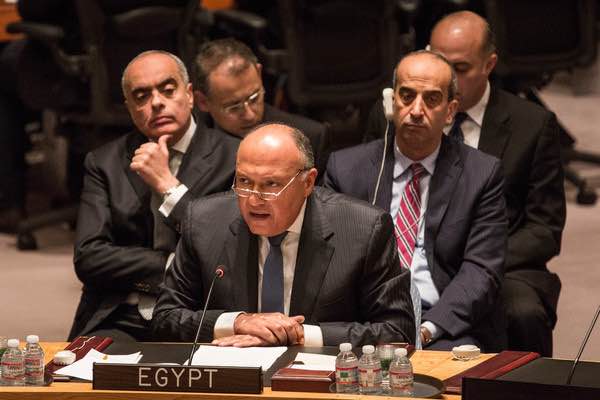TRIPOLI: The head of Britain’s armed forces urged NATO to widen its bombing campaign as a revolt against Libya’s regime entered its fourth month and the UN special envoy was expected in Tripoli on Sunday.
"The vice is closing on (Moammar) Qaddafi, but we need to increase the pressure further through more intense military action," General David Richards, chief of the defence staff, told the Sunday Telegraph.
The general said he wanted NATO member states to support the targeting of Qaddafi’s regime, not just targets which pose an immediate threat to civilians, such as tanks and artillery.
"The military campaign to date has been a significant success for NATO and our Arab allies. But we need to do more." Richards said.
"At present, NATO is not attacking infrastructure targets in Libya. But if we want to increase the pressure on Qaddafi’s regime then we need to give serious consideration to increasing the range of targets we can hit."
The UN special envoy for Libya, Abdul Ilah Al-Khatib, said in Athens meanwhile that he would travel to Tripoli on Sunday.
Speaking after talks with Greek Foreign Minister Dimitris Droutsas, Khatib said he thanked Greece for its support for his flight to Tripoli.
A Greek foreign ministry source said Khatib would be flying aboard a Greek military aircraft.
UN chief Ban Ki-moon had said earlier in the week he was dispatching Khatib for talks with Libyan Prime Minister Baghdadi Mahmudi.
Ban said in Geneva he had urged Mahmudi on Tuesday to halt attacks on civilians immediately and called for "immediate verifiable ceasefire negotiations towards the peaceful resolution of the conflict and unimpeded access to humanitarian workers."
Protests against Qaddafi’s 41-year autocratic rule began on February 15 and quickly escalated into a popular uprising, inspired by revolts in Tunisia and Egypt that toppled their respective hardline rulers.
Qaddafi ordered his forces to crush the uprising, prompting an armed rebellion which has seen much of eastern Libya fall into the hands of insurgents who have vowed to march on Tripoli and topple Qaddafi.
On March 19, French, US and British forces, under a UN mandate to protect civilians, launched air strikes on Qaddafi’s forces in a campaign that was taken over by NATO on March 31.
The alliance has been accused by the Libyan regime of failing to comply with its mandate by going after civilian targets and putting Qaddafi himself in their crosshairs.
State news agency JANA reported new NATO air strikes late Saturday in the Libyan regions of Bir Al-Ghanam, Njila and the city of Al-Azizya, southwest of Tripoli.
Citing a military source, the agency reported that "civilian and military" sites had been targeted and that the strikes had caused "human and material damage." It provided no further details.
Qaddafi’s regime has criticised a NATO air strike on the eastern city of Brega that the alliance said targeted a military site.
Government spokesman Mussa Ibrahim said the Brega attack early on Friday killed 11 imams, or prayer leaders, and wounded at least 50 other people.
Hundreds of people gathered at a cemetery in Shatia Al-Henshir, east of the capital, Saturday shouting "jihad, jihad;" "martyrs of Libya" and "God, Libya and Moamer" as they buried the dead.
NATO said a "command and control bunker was struck in Brega … as the structure was being used by the Qaddafi regime to coordinate strikes against the Libyan civilian population."
Qaddafi, whom Italy claimed on Friday might be wounded and on the run, said he was beyond the reach of NATO bombs.
"I want to say to the Crusader cowards that I live in a place where I cannot be reached or killed; I live in the hearts of millions," he said in an audio message aired late Friday on state television.
An April 30 air strike missed Qaddafi but killed his son, Seif Al-Arab, and three of his grandchildren.
On the battlefield, rebels made new progress in their advance towards the western port city of Misrata.
An AFP correspondent said they had moved 20 kilometres (12 miles) in the east to reach the gates of Tavarga and in the west they reached the gates of the city of Zlitan — their next main military target on the road to Tripoli.
In Paris, senior rebel leader Mahmud Jibril met President Nicolas Sarkozy to discuss the three-month-old conflict and the prospects for transition, a day after a White House session with one of US President Barack Obama’s top aides.
Saturday’s meeting, after which no statement was released, was also intended to discuss where to enlarge the international contact group on Libya, which France wants to include Russia and others.
France, Gambia, Italy and Qatar are the only countries to have formally recognized the rebels’ National Transitional Council (NTC) as the Libyan people’s legitimate representative.
During a meeting in Rome last week, the contact group decided to set up a special fund to help the rebels.
On Friday, Jibril was received at the White House by Obama’s national security adviser Tom Donilon, but failed to garner the prize of US recognition.
